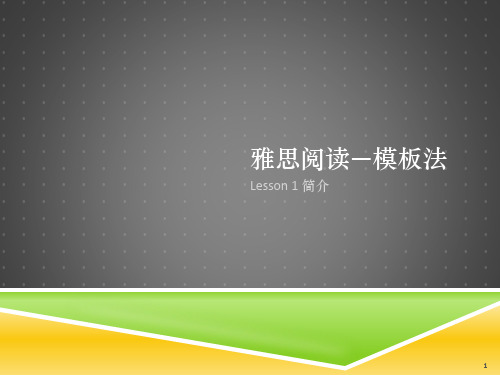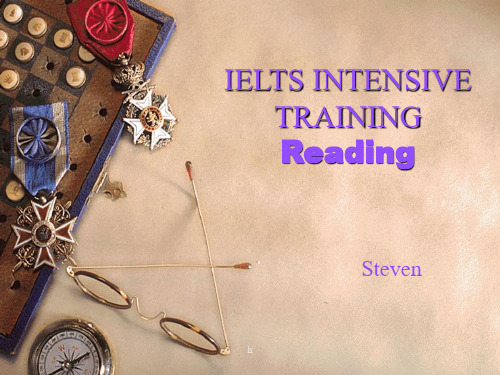1雅思基础阅读课件
《雅思基础阅读》PPT课件

4. It is too late to do anything to help many languages, where the speaker are too few or too old, and where the community is too busy just trying to survive to care about their language.
Q:What was the money raised for?
4.The convergence〔收敛〕 of the two growing trends– droping out and logging in—exacerbates〔恶化〕 the serious consequences of a drop in political involvement and rise in social isolation.
不良阅读习惯:指读,逐字逐句读,"盲读" 好的阅读习惯:skimming & scanning
读文章时重点关注
1.标题和副标题 2.topic sentences<每段首末句〕 3.关联词 4.定位关键词〔key words> 5.高频词 6.suggest, show,indicate, demonstrate,
Q: What will help the understanding ?
6.Nowhere were the changes felt more keenly than at Mawson, where the old quarters, with their rugged outpost 〔边区 村落〕atmosphere, were shut and the last team of huskies removed.
雅思阅读必看 ppt课件

Summary-Choose the word from the list
雅思阅读必看
Attention
题目要求字数很重要 原词填空 寻找定位词;找到summary在文章中定位
雅思阅读必看
Blank filling-Completion of tables
NO MORE THAN THREE WORDS
雅思阅读必看
Signs of a heart attack
雅思阅读必看
$180
$670
$
$34
$
$
$
$
$ $
$ $$
雅思阅读必看
$4600
Skim(略读)
to know the main idea of each paragraph
Where is the topic sentence?
At or near the beginning 70%
6
36-38
雅思阅读必看
Band score
6.5 7 7.5 8 8.5
Six Question Types of IELTS
判断题
(true/false/not given)
雅 思
阅
配对题(matching)
读
选择题(multiple-choice)
填空题(blank filling) 简答题 (short answer)
True:选项与文章的意思相同 False:选项与文章意思不符 Not Given:文章没有提到的信息
雅思阅读必看
Summary
Use the word from The passage
Choose the word from the list
雅思阅读,IELTS,精品版讲义课件

was were 一般过去时态:was \were
主动: 过去进行时态:was\ were +doing
一般过去时态:was \were done
被动: 过去进行时态:was \were being done
三、 have has 一般现在时态: have\has
现在完成时态: have\has done
被动语态:have\has been done
现在完成进行时态:have\has been doing
had 一般过去时态:had
过去完成时态:had done
被动语态:had been done
过去完成进行时态:had been doing
பைடு நூலகம்
情态动词 包括:can could will would should may need must ... + do
雅思阅读
雅思复习是个苦差事 稳扎稳打才是硬道理
• 巧学+苦练=0.5—1分的提高(每月) • 巧学
1 语法 2 词汇 3 粗译—翻译主干 总结段意
苦练 练习剑桥真题5-9 其中8·9练速度
总计划—月计划—周计划—天计划—小时计划
雅思阅读的形式和实质
• 1小时
雅思阅读考试时长为1小时。Time is the biggest enemy. 对于中 国考生来说,雅思考试阅读部分最让他们头疼的是:读不完文章,做 不完题目。
应句(一句或二三句)然后判断做题 注意事项:
注意题目答案的拼写要求 例如“TRUE”不要写成“true、yes 或打钩哟!
第二大题型 判断题
每题做题的时间不准超过两分钟 因为有些题目NOT GIVEN
雅思阅读第一次课(课堂PPT)

4
评分标准
Number of correct answers IELTS band score
40
9
38-39
8.5
36,37
8
33-34
7.5
30-32
7
27-29
6.5
23-26
6
20-22
5.5
5
一 、如何开始准备雅思阅读考试 四大技能的要求
快速阅读 词汇记忆 语法突破 强化技巧
6
第一个技能:快速阅读
The light rain dampened the crowd's enthusiasm. Raising interest rates might dampen the economy. to make a sound or movement less loud or strong The spring dampens the shock of the impact.
【重要词汇】overhang / ˈəuvəhæŋ; ˋovɚˏhæŋ/ n. part that overhangs 悬垂的部分: a bird's nest under the overhang of the roof房檐下的鸟巢.
20
E The roof of a Japanese temple building can be made to overhang the sides of the structure by fifty per cent or more of the building's overall width.For the same reason, the builders of Japanese pagodas seem to have further increased their weight by choosing to cover these extended eaves not with the porcelain瓷tiles 瓦of many Chinese pagodas but with much heavier earthenware陶器 tiles.
雅思阅读,IELTS,精品版讲义课件

• 3 快速浏览文章,扫描特定信息 方法 题目理解+定位词 原文 主干+定位词
找到定位词后先粗后细理解
评分标准
阅读五大题型
第一大题型 主观题
包括summary 填空 图表 简答
1、浏览题目要求 对应段 字数要求 2、精读题目相关内容(尽可能翻译) 注意:时间 地点 专有名词不翻译 中英结合 不认识的名词可以用ABC来代替 3、定位和预测 定位:时间 地点 专有名词是最好的定位词 其它的名词作为辅助定位词(常被替换) 预测:预测词性(名词需要判断单复数) 预测词的大致方向(如专家、植物名称等) 4、如果有备选项 要利用备选项进行语法逻辑 筛选 (有备选项的题目 有可能不按顺序出题) 常用词法搭配 :动词V+副词adv 副词adv+形容词adj 形容词adj+名词n
状语从句
状语从句(很easy,关键看连接词的意思,即可判断) 如 1 when 时间状语 当...的时候 在句子开头 或A句\whenB句 、 宾语从句 tell sb when +句子 定语从句 ...+n when +句子 when=介词+n 2、as 当...的时候 时间状语从句 因为 由于 原因状语从句 如象 方式状语从句 尽管 让步状语从句
定语从句
D、定语从句 修饰名词代词的成分是定语 定语是一个句子 叫定语从句 that 后句子完整 为同位语从句 名词、代词后that+从句 that后面句子不完整 为定语从句 如:The news (that he won the prize) is true The news (that he told me) is true 名词、代词后Which、Who 、Whom、When、Where、Why 加句子99%是定语从句 其中When、Where、Why 只需=某一介词+前面名词 即可判定为定语从句 例如:Do you remember the place where we lived last year where= in the place 另外:名词、代词后一个主谓结构,通常是省略了that的定从 例如:People worry that the endless rise in the amount of stuff (everone throws away) will cause the world to run out of places to dispose of waste
雅思阅读讲义ppt课件

阅读的词汇量要求最大,熟 练度较低
3
雅思阅读考试与题型分析
听力结束后开始,1小时时间 阅读量:3篇文章,共2000-2750词 文章来源:报纸,书籍,杂志,学术期刊。至少一篇议论文 假设口语速度为125 Words/分钟,仅仅看完以上3篇文章就需要20
分钟+,所以没有必要把文章读完再做题。
雅思阅读—模板法
Lesson 1 简介
1
目录
雅思阅读考试与题型分析 试题拆解与攻略 试题常见陷阱与分析2雅思阅读考试与题型分析
雅思阅读课件ppt大纲

目录
雅思阅读考试概述 雅思阅读题型解析与技巧 雅思阅读文章类型及应对策略 雅思阅读词汇和语法要点 雅思阅读备考策略与建议
01
CHAPTER
雅思阅读考试概述
评估考生在学术英语环境中的阅读能力,包括理解主旨、细节、推理和词汇等能力。
目的
考生需要在规定时间内完成三篇不同主题和难度的学术文章阅读,并回答相关问题。
复杂句型结构
省略和倒装
插入语和同位语
长句的理解策略
05
CHAPTER
雅思阅读备考策略与建议
根据个人情况,合理安排备考时间,确保有足够的时间进行复习。
确定备考时间
将整个备考过程划分为若干个阶段,并为每个阶段设定具体的复习目标和计划。
制定阶段性目标
每天安排一定的阅读任务,包括阅读文章、做题、总结等,保持阅读的连续性和稳定性。
要求
雅思阅读考试目的与要求
涵盖社会科学、自然科学和人文科学等领域的学术文章,涉及说明文、议论文、实验报告等多种文体。
采用多项选择题、填空题、判断题、配对题等多种题型,以全面评估考生的阅读能力。
雅思阅读考试内容与形式
形式
内容
根据考生回答问题的正确率进行评分,正确率越高得分越高。
准确性
评估考生在回答问题中使用的词汇和语法的准确性和丰富性。
注意事项
填空题的答案通常具有唯一性,考生需要确保自己填写的单词或短语与原文内容完全匹配。同时,要注意审题,避免将注意力过多地集中在寻找答案上而忽略了其他重要信息。
填空题题型解析与技巧
题型特点
匹配题是雅思阅读中的一种较为复杂的题型,通常要求考生将原文中的信息与题目中给出的信息进行匹配。这种题型主要考查考生的信息筛选和整合能力。
雅思阅读第一第二节ppt

思路总结
投机取巧法 低分段烤鸭 高高分段烤鸭 填词的题型,题⺫目目中出现过的 词都不会作为答案。 生生僻字容易作为答案。
TRUE/FALSE/NOT GIVEN
(判断题)
题型初览
• • •
C7 T2
C7 T3
C5 T1
思维转换
•
原文文:You never see him, but they're with you every time you fly. They record where you are going, how fast you're traveling and whether everything on your airplane is functioning normally. Their ability to withstand almost any disaster makes them seem like something out of a comic book. They're known as the black box.
•
The FAA was created as a result of the introduction of the jet engine.
EXAMPLE2
•
The FAA was created as a result of the introduction of the jet engine.
EXAMPLE2
•
An accident that occurred in the skies over the Grand Canyon in 1956 resulted in the establishment of the Federal Aviation Administration (FAA) to regulate and oversee the operation of aircraft in the skies over the United States, which were becoming quite congested.
《雅思基础阅读》PPT课件

Steven
h
1
雅思阅读评分标准及换算
1:1 2-3:2 4-9:3 10-12:3.5 13-15:4 16-17:4.5 18-20:5
21-22:5.5 23-25:6 26-27:6.5 28-30:7 31-32:7.5 33-35:8 36-38:8.5 39-42:9
T/F/NG
The community of some languages is busy trying to care about their language.
h
14
5. What is astonishing, however, is the way in which people treat deception.
h
2
题型介绍
1.Heading 2.Matching 3. True/Talse/Not Given 4.Multiple choices pletion(summary & sentence
completion) Short Answer Qustions Diagram(labelling,flowchart,table)
Q: What are the problems?
h
12
3.Popular illustrated magazines rapidly became an important and significant factor to the literate in Australia, who was forming our national image, as were the singers of ballads(民歌) and strolling(巡回演出) entertainers who were also making a major contribution.
《雅思基础阅读》课件

本PPT课件旨在帮助学生掌握雅思基础阅读技能,通过丰富的学习内容和实用 的学习方法,提升阅读能力。
课程介绍
课程目标
明确学习目标,帮助学生取 得高分雅思阅读成绩。
学习内容
涵盖雅思基础阅读所需的各 种技巧和知识。
学习方法
提供有效的学习方法和辅助 学习资源。
雅思基础阅读技能
雅思阅读技巧训练
基础篇
提供基础训练材料,帮助学生掌 握阅读基本技能。
进阶篇
提供更难的阅读材料,提升学生 的阅读水平。
提高篇
深入探讨高难度阅读材料,帮助 学生解决复杂题目。
雅思阅读例题解析
题目分析
解读真实的雅思阅读例题,剖 析解题思路。
答案解析
详细解释正确答案的选择理由, 并讲解干扰项。
答题技巧总结
雅思辅导书籍
推荐一些常的雅思辅导教材 和参考书籍。
总结和展望
学习收获
总结学生在本课程中的学习收获和提升。
待改进之处
回顾课程中存在的不足,给予学生改进建议。
学习计划制定
指导学生制定个性化的学习计划,提高学习效果。
1
阅读技巧
2
教授实用的阅读技巧,提高学生的解题
速度和准确性。
3
阅读理解
培养学生理解和分析阅读材料的能力。
词汇量
帮助学生扩大词汇量,提升词汇应用能 力。
雅思阅读模块分析
1 阅读考试形式
详细分析雅思阅读考试的 组成和答题要求。
2 题型分析
解析各种题型,提供针对 性的解题技巧。
3 答题技巧
介绍解答题目的常用技巧 和方法。
总结各题型解决问题的方法和 注意事项。
考试技巧
雅思阅读题型+解题技巧(第1讲)ppt课件

Annie Huang
.
1
IELTS FOR WHAT?
.
2
Tongue twister
• 1.Can you can a can as a canner can can a can? • 1.你能够像罐头工人一样装罐头吗?
• 2.I wish to wish the wish you wish to wish, but if you wish the wish the witch wishes, I won't wish the wish you wish to wish.
.
14
图形化
summar y题。
.
15
• 雅思阅读考试需要我们具备的基本能力: 1. 一定的词汇量 2. 长难句阅读分析 3. 把握文章主旨和段落大意 4. 细节信息定位 5. 快速阅读 6. 同义转换
.
16
词义推测
• 一、利用上下文线索猜测词义。 • 1.根据同义、反义关系猜词。 • 2.根据句意或段落文章的上、下文猜测词义。 • 二、利用构词法猜测词义。
.
26
雅思阅读顺序
• Skimming全文--文章主旨,段落大意,文章结构,细节标 注
• 读题--定位词 • Scanning--文中对应信息 • 答题--同义转换
.
27
Scanning—定位词的选取
• 题干有特征词的题目: 最高级,比较级,数字,以大写字母 开头的专有名词,引号等标点
.
28
1. Scanning原则一:无法用特征词定位时,用题干中的名词 >动词>形容词or副词定位。 notice: 有可能对应回原文是同义词。
1雅思基础阅读课件

Reading handout for lesson 1Part 1Part 1.1 : VocabularyChess Basketball Board games Sports Swimming Tennis CardsDancing Weightlifting Skiing Yoga Shopping Exercise Having fun Partying Karate Poker Puzzles Kick boxing Hiking Sharing ChattingPart 1.2: Practice3Part 2:Reading1.Read the following text and then look at the questions on the next page.The value of friendshipRecent research into the world of teenagers has suggested that they value friendship above everything else. Children aged between 12 and 15 were asked what was important to them. Their answers included possessions such as money and computer gadgets but also relationships with people. The teenagers questioned said that friends were the most important to them, more even than family, or boyfriends and girlfriends.We wanted to find out more about the results of this research so we asked our readers what they thought about the value of friendship. Here are some examples of what they said about their friends:Ben, 15: Every time I have a fight with my parents, I need some time on my own. But after that, the first thing I do is meet up with my friends. After playing football for a while, or skateboarding, I usually feel much happier again.Rory, 13: When I moved to a village in the countryside, I thought that it would be the end of my friendships. But my old friends have kept in touch and they come and visit in the holidays. There's a lake nearby, so we often go sailing, water-skiing or windsurfing. And I have made some new friends here too, at school, and since I joined the rugby club.Carlos, 11: Last year, I broke my arm on a skiing holiday. Unfortunately, it was my left arm and I am lefthanded. My school friends all helped and copied their notes for me.It seems that our readers value their friendships very highly. From what they told us, they spend a lot of time with their friends, just hanging out, or sharing hobbies and interests. They seem to need their friends for advice, help, chats, and for having fun. Clearly, friends make each other feel better. Looking at what our readers told us, the results of the recent research are not really surprising.2.Try to answer this question yourself first, before reading the explanation. Choose the best answer from the letters a-d.To teenagers, money is ...a)not important.b)as important as computer gadgets.c)as important as relationships with people.d)less important than friendships.3. Look at the questions in Exercise 4, without reading the answer options. Underline the question words (e.g. where, when, what) and the key words in each of the questions (1-3) and sentence stems (4-5).4. Now answer these multiple-choice questions. Choose the appropriate letter a, b, c or d.i.Why are Ben, Rory and Carlos mentioned in the article?A.They know why teenagers value friendship.B.They gave information about themselves.C.They read magazines,D.They are teenage boys.ii.Which of the following best describes Ben?A.He often has fights,B.He likes being alone.C.He is happier than his friends,D.He likes some sports.iii.What do we know about the lake that Rory visits?A.It is near the school。
- 1、下载文档前请自行甄别文档内容的完整性,平台不提供额外的编辑、内容补充、找答案等附加服务。
- 2、"仅部分预览"的文档,不可在线预览部分如存在完整性等问题,可反馈申请退款(可完整预览的文档不适用该条件!)。
- 3、如文档侵犯您的权益,请联系客服反馈,我们会尽快为您处理(人工客服工作时间:9:00-18:30)。
Reading handout for lesson 1Part 1Part 1.1 : VocabularyChess Basketball Board games Sports Swimming Tennis CardsDancing Weightlifting Skiing Yoga Shopping Exercise Having fun Partying Karate Poker Puzzles Kick boxing Hiking Sharing ChattingPart 1.2: Practice3Part 2:Reading1.Read the following text and then look at the questions on the next page.The value of friendshipRecent research into the world of teenagers has suggested that they value friendship above everything else. Children aged between 12 and 15 were asked what was important to them. Their answers included possessions such as money and computer gadgets but also relationships with people. The teenagers questioned said that friends were the most important to them, more even than family, or boyfriends and girlfriends.We wanted to find out more about the results of this research so we asked our readers what they thought about the value of friendship. Here are some examples of what they said about their friends:Ben, 15: Every time I have a fight with my parents, I need some time on my own. But after that, the first thing I do is meet up with my friends. After playing football for a while, or skateboarding, I usually feel much happier again.Rory, 13: When I moved to a village in the countryside, I thought that it would be the end of my friendships. But my old friends have kept in touch and they come and visit in the holidays. There's a lake nearby, so we often go sailing, water-skiing or windsurfing. And I have made some new friends here too, at school, and since I joined the rugby club.Carlos, 11: Last year, I broke my arm on a skiing holiday. Unfortunately, it was my left arm and I am lefthanded. My school friends all helped and copied their notes for me.It seems that our readers value their friendships very highly. From what they told us, they spend a lot of time with their friends, just hanging out, or sharing hobbies and interests. They seem to need their friends for advice, help, chats, and for having fun. Clearly, friends make each other feel better. Looking at what our readers told us, the results of the recent research are not really surprising.2.Try to answer this question yourself first, before reading the explanation. Choose the best answer from the letters a-d.To teenagers, money is ...a)not important.b)as important as computer gadgets.c)as important as relationships with people.d)less important than friendships.3. Look at the questions in Exercise 4, without reading the answer options. Underline the question words (e.g. where, when, what) and the key words in each of the questions (1-3) and sentence stems (4-5).4. Now answer these multiple-choice questions. Choose the appropriate letter a, b, c or d.i.Why are Ben, Rory and Carlos mentioned in the article?A.They know why teenagers value friendship.B.They gave information about themselves.C.They read magazines,D.They are teenage boys.ii.Which of the following best describes Ben?A.He often has fights,B.He likes being alone.C.He is happier than his friends,D.He likes some sports.iii.What do we know about the lake that Rory visits?A.It is near the school。
B.It is near his home.C.It is used by a lot of people who do water sports。
D.It is in a village.iv.Carlos mentions that he is left-handed because ...A.it makes skiing harder.B.it makes it worse that he broke the arm he uses most.C.it is an interesting fact about himself and he was talking about his left arm.D.it is very unfortunate when you break your left arm.v.The answers to the recent research and the answers from the readers ...A.were surprisingB.were the same.C.were similarD.were both about sports.Part 3:HomeworkQuestions 1 -6 Choose the appropriate letters a, b, c or d.i.How many friends do the majority of people probably have?a)30 real friends or fewerb) a minimum of 30 real friendsc)150 internet friendsd)400 internet friendsii.It is difficult...a)to believe the numbers about friendship.b)to keep your friends happy.c)to trust what you read on social networking sites.d)to give a definition of 'friendship'.iii.Friendship means ...a)different things to different people.b)dying for your friends if you need to.c)helping each other until it is no longer necessary.d)accepting people with different views.iv.Sometimes people worry because ...a)they think that they have too many friends.b)they spend too much time with friends.c)they think they are too old to make friends.d)there are no guidelines about friendship.v.Most o f us...a)are dissatisfied with our friends.b)build friendships late in life.c)are frightened to talk to strangers.d)need to be with others.vi.What does 'Strangers are friends we have not met yet' mean?a)We have not met strangers before,b)Strangers are also our friends.c)We should not talk to strangers.d)Strangers may become our friends.It is said that most people have no more than 30 friends at any given time, and 400 over the whole of their lives. However, on social networking sites, most users have about 150 friends. If these numbers are correct, then friendship means different things in different situations.One of the reasons for having more online friends than real friends at a certain point in time is that online friendships do not require much time and energy: it is easy to accept friendships and keep them forever. Another possibility is that it is difficult to say 'no' when somebody asks us to be their friend online, even if we feel we don't really know them. The fact that they ask us suggests that they do consider us a friend, which is a nice feeling. Alternatively, they may be 'collectors' of online friends and just want to use us to get a higher number of friends and appear to be popular.Online friendships are quite easy, but in the real world decisions about friendships are harder to make. There are no rules about friendship. There are no guidelines about how to make friends, how to keep friendships going, and how to finish friendships if we want to move on. People have very different opinions about this: some people would die for their friends and they value them more than family. Others say that friends are temporary, only there to help each other until they are no longer needed. If people with such different views become friends, this can lead to problems.Because of these different definitions of friendship, it is easy to be unhappy about our friendships. We may want them to be deeper or closer, or we may want to have more friends in our lives. Sometimes we simply do not have the time to develop our friendships, or we fear we have left it too late in life to start. If we move to another country or city, we have to find ways to make new friends again.This dissatisfaction shows us how important friendships are for most of us. We should not think that it could be too late to build friendships. We also need to understand that the need to be around other people is one that is shared by many. Therefore, we should not be too frightened about starting to talk to people who in the future may become our friends: it is likely that they too would like to get closer to us. Remember what people say: strangers are friends we have not met yet.。
